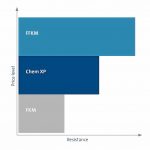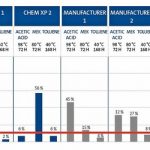The seals used for equipment in the chemical process industry today are mainly made of fluorinated materials (Figure 1). The amount of fluorine and the composition of the formulation affect the cost of the material on one hand and the resistance of the various fluoro elastomers to acids, bases and solvents on the other. Fluoro rubber (FKM) is widely employed as a standard material in chemical processes. In many applications, this material is a suitable choice for O-rings, formed parts and diaphragms. For example, standard FKM is distinguished by its high resistance to mineral oils and other hydrocarbons. However, its resistance to certain acids, bases and organic solvents is comparatively low. If FKM comes into contact with increased concentrations of these media, they can attack it chemically and cause it to swell, leading to significant changes in its mechanical qualities. In this event, the material foundation must be selected and combined differently, so that it can withstand chemical attack. In especially demanding applications, perfluoro rubber (FFKM) is the preferred material because it offers excellent media resistance due to its complete fluorination. Unfortunately, in the light of factors like its elaborate production process, FFKM is very costly and the extremely high level of performance it achieves is not necessarily a requirement.
Good balance
With this in mind, Freudenberg Sealing Technologies has developed a new line of materials called Chem XP, which fills the gap and creates a good balance between performance and cost. Its characteristics include resistance to temperatures between –20 and +200 °C as well as better chemical stability than FKM in contact with many acids and organic solvents. Chem XP is also highly resistant to ultraviolet light and ozone and has very good aging behaviour. In June 2018, this innovation was presented to industry professionals for the first time at Achema. Figure 2 shows a schematic comparison of the price levels and resistances for standard FKM, the premium material FFKM and the newly developed Chem XP material family.
When Chem XP replaces FKM in an application, the operating life increases, enabling maintenance intervals to be extended and production costs reduced. The risks of unplanned equipment downtime are simultaneously minimised, avoiding the high follow-up costs to operators that are associated with stoppages. Choosing Chem XP materials also helps cut the costs for materials. Since Chem XP’s media resistance to selected acids and organic solvents is comparable to that of FFKM, substitution is possible in these cases and the very high price of FFKM seals averted.
Formulation for the elastomer mixture
When they developed Chem XP, Freudenberg Sealing Technologies’ material experts devoted particular attention to the broadest possible resistance to aggressive media. Amongst other things, the Chem XP material family has a high fluorine content similar to that of FFKM materials. In combination with a new formulation for the individual components, Chem XP achieves a high degree of media resistance, which has been successfully demonstrated in comparative analyses and lab tests.
Lab tests with acids and solvents
The Chem XP material family was investigated in lab tests, in order to identify changes in swelling and strength and compare it with other materials available in the market. As the benchmark for these comparative analyses, the material developers at Freudenberg Sealing Technologies selected three of the most critical representatives of each chemical class which is relevant for the chemical industry. A 20 % concentration of acetic acid was chosen to represent the acid class at a temperature of 98 °C. Pure methyl ethyl ketone (MEK) represented the solvent class at a temperature of 80 °C, while pure toluene at 40 °C represented the alkylbenzenes. Demanding, challenging conditions were deliberately created for the materials, with storage temperatures very close to boiling point in the first two cases. The test samples were exposed to acetic acid and MEK for three days and immersed in toluene for an entire week.
Results of the lab tests
Changes in volume such as swelling or shrinkage give an indication whether a material absorbs media or gives off components. Swelling was the sole relevant criterion for the Chem XP lab tests. If swelling is not limited to a certain degree, seals can lose their functionality and leaks could occur. For the purposes of the tests, a maximum permissible volume change of +10 % was set. A standard FKM, the proven
75 Simriz 495 and four special, highly fluorinated varieties of FKM from competitors were used for reference.
As Figure 3 shows, the standard FKM material is not suited for these demanding test conditions. Especially in acetic acid and MEK, the swelling was far too great; the seals would deteriorate in the foreseeable future. The tested elastomer mixtures from manufacturers 1 and 2 exhibited clear weaknesses during the acetic acid test. The same was true of the mixtures from manufacturers 2 and 3 in MEK. Only the material from manufacturer 4 could be used with certain limitations in the test conditions. In acetic acid and toluene, the Chem XP 1 variant delivered results that were comparable to the very low volume change for
75 Simriz 495, the FFKM material participating in the test. At temperatures below +80 °C, the material also showed outstanding stability in MEK. The Chem XP 2 variant which was tested in parallel likewise demonstrated good resistance to acetic acid and toluene, but is only limitedly suited for use in MEK at +80 °C.
Standard FKM also proved to be unsuitable during the strength tests (see Figure 4). In addition to a high degree of swelling, the more than 30 % reduction in strength indicates chemical breakdown of cross-linkages and polymer chains in the elastomer matrix. The materials from manufacturers 1 to 4 showed an impermissible deterioration in strength in MEK, similar to the picture for manufacturers 3 and 4 in toluene. This puts the moderate swelling values of manufacturer 1 in MEK (Figure 3) into perspective: with an up to 60 % loss of strength, it was discarded as a potential candidate. In all cases, the strength values for Chem XP 1 were within the tolerance limits and comparable to the very good values of
75 Simriz 495. The excellent volume stability of Chem XP 2 in acetic acid and toluene was confirmed by the only slightly reduced strength in both cases.
In summary, it can be said that the newly developed Chem XP materials rank directly below FFKM in terms of media resistance and in the future can serve as standard materials for the chemical processing industry. Lab tests confirmed that they provide a very good balance between performance and cost.
The first seals made from Chem XP are expected to be ready for serial production in early 2019. O-rings and formed parts are among the possible varieties of seals suited for this material. The exact material types and applications will be determined in joint tests with customers. Freudenberg’s development engineers are simultaneously working on other variations of the new material family.
Online search: cpp0119freudenberg
Author: Dr. Robert Rotzoll
Business Development Manager Process Industry,
Freudenberg Sealing Technologies











